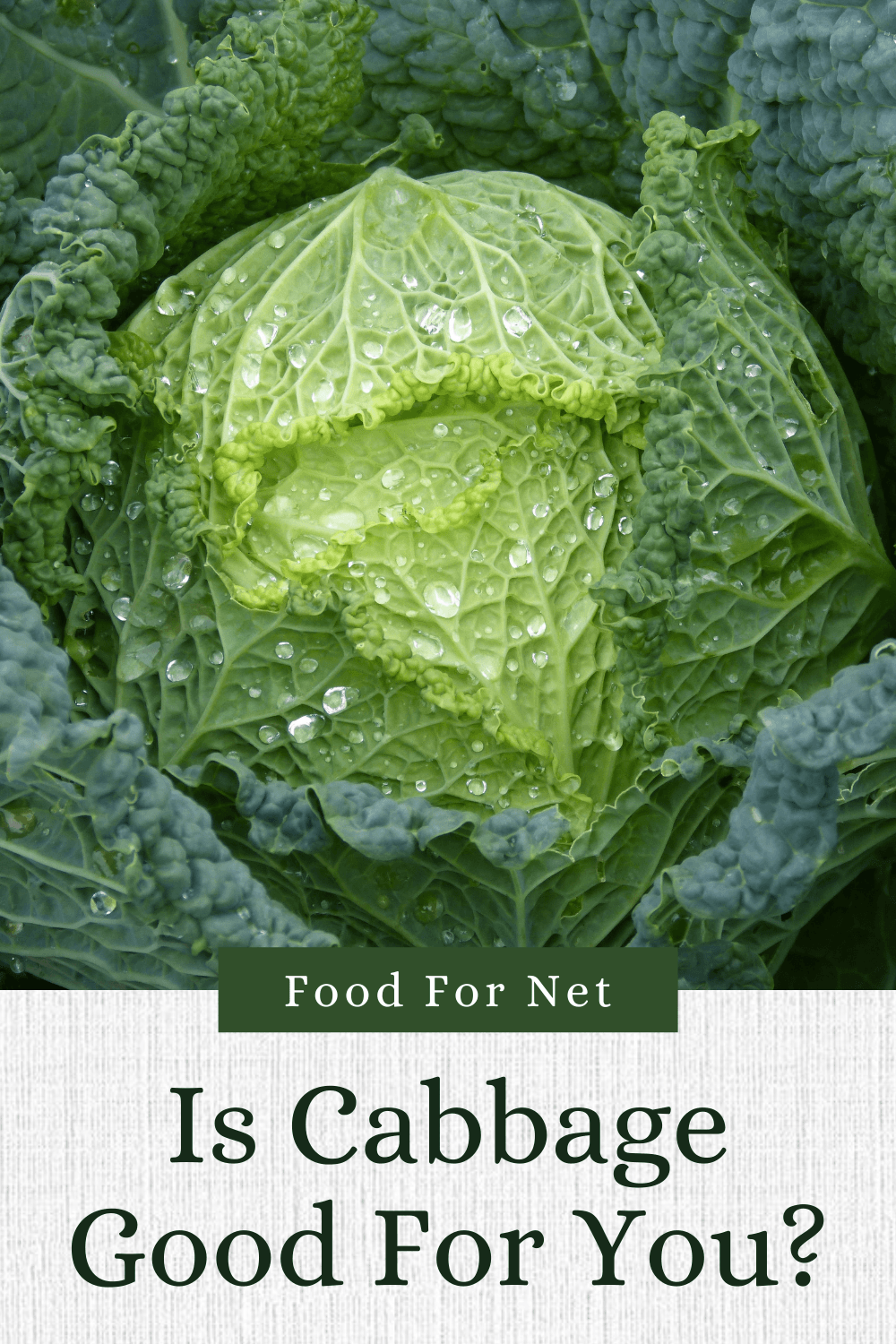
Cabbage isn’t the most exciting vegetable. There, I’ve said it. We often overlook cabbage in favor of more interesting and trending ingredients, like kale, berries, avocado, and salmon. But should you be eating cabbage and is cabbage good for you?
The humble cabbage does so much. It’s the base ingredient in many dishes, like sauerkraut and coleslaw, and can be used in countless other ways. You can even make pancakes and dumplings out of cabbage, or cabbage leaves as a type of wrap instead of a tortilla.
We have to ask though, is cabbage good for you? Well, while cabbage isn’t the most nutrient dense vegetable out there, it does offer a surprising array of benefits, including some unexpected ones.
Is Cabbage Good For You?
- Type Of Cabbage
- Cabbage Nutrition
- Benefits Of Cabbage
- How Cabbage Could Be Harmful
- Is Cabbage Low In FODMAPs?
- The Benefits Of Fermented Cabbage
- Final Thoughts
Types Of Cabbage
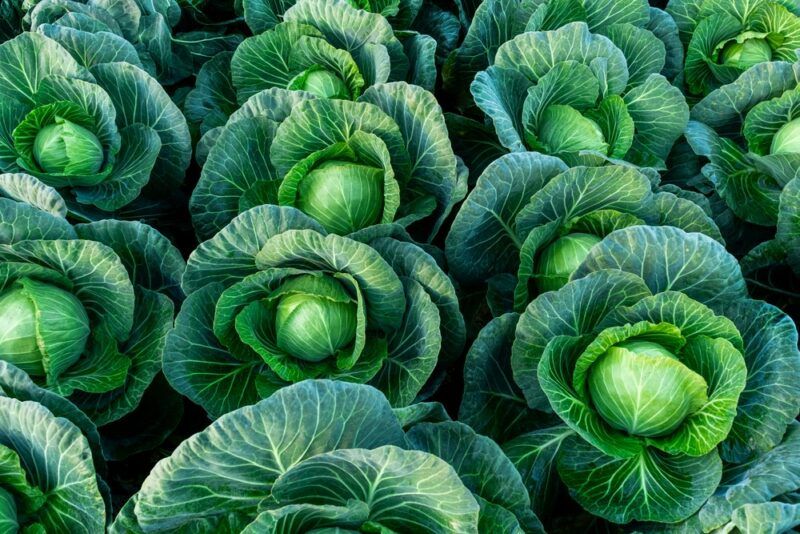
Without a doubt, the most familiar type of cabbage is the large green version, but this is far from the only type. As with most vegetables, there are many different varieties.
Some main types to look out for include:
- Green cabbage. This quintessential cabbage is easy to find and just as easy to use. It has tightly packed leaves and may feel surprisingly heavy when you first pick it up.
- Red cabbage is hard to miss, given its bright red/purple coloring. If you ignore the coloring though, red cabbage looks much like regular green cabbage and can be used in the same ways.
- Savoy cabbage (or curly cabbage). This version has ruffled leaves with plenty of ridges. It isn’t as tightly packed as green cabbage and the leaves tend to be more tender. This tenderness means that the cabbage leaves are exceptional in the place of tortillas as a wrap.
- Napa cabbage (or Chinese cabbage). This unusual cabbage is yellow-green in color, has frilly leaves, and is somewhat oblong in shape. You can use this type of cabbage cooked or raw. It’s delicious either way.
Of these types, red cabbage may be the healthiest, as it contains pigment molecules known as anthocyanins. Anthocyanins are particularly powerful antioxidants and have plenty of other roles in the body too. They’ve even been linked to decreased blood pressure, so they may lower your heart disease risk.
Cabbage Nutrition
Before we dig into the benefits, we also need to talk about the nutrients in cabbage. After all, these are critical for your health. For a cup of chopped cabbage, the nutritional profile looks like this:
- Calories: 22.2
- Carbohydrates: 5.2 grams
- Fiber: 2.2 grams
- Sugars: 2.8 grams
- Protein: 1.1 grams
- Fat: 0.1 grams
- Vitamin K: 85% of your daily needs
- Vitamin C: 54% of your daily needs
- Folate: 10% of your daily needs
- Vitamin B6: 6% of your daily needs
There are other nutrients present too, of course, but in smaller quantities – often less than 5% of your daily needs.
The vitamin C in cabbage is particularly interesting, as it is relevant for your immune system and many other functions. Even if you’re already getting enough vitamin C, increasing your intake could provide health benefits.
Then there’s the vitamin K, which is relevant for blood clotting, and vitamin B6, which is important in energy metabolism. Folate is essential for pregnant women, although the rest of us still need folate to stay healthy as well.
Don’t forget that cabbage is low in calories too. As such, it’s a very easy way to get more nutrients in your diet.
Benefits Of Cabbage
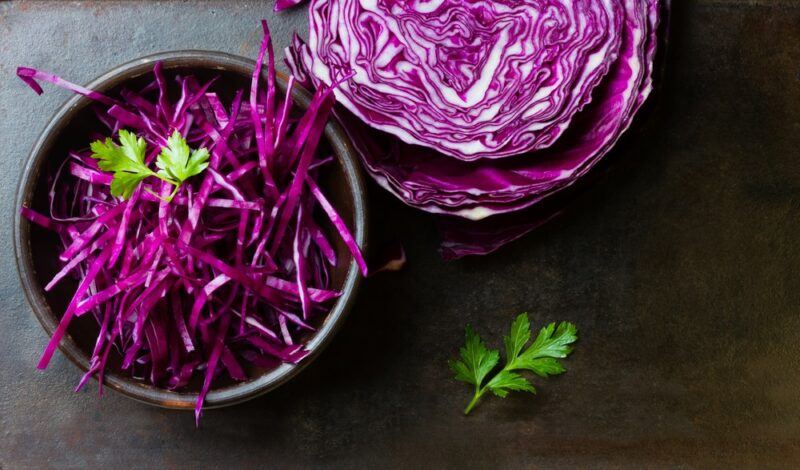
Useful For Weight Loss
Cabbage works well for weight loss. Not only is it low in calories, but the vegetable also provides some fiber and plenty of water. This combination of features means that cabbage should help to keep you satisfied.
Plus, you can use cabbage instead of some less healthy ingredients. The most common example is swapping out a high carb tortilla wrap for cabbage leaves instead.
Don’t forget about salads like coleslaw either. As long as you don’t go overboard with the dressing, such dishes can keep you satisfied without adding much to your calorie intake at all.
It Offers Some Antioxidants
Cabbage provides you with some antioxidants too, especially if you focus on red cabbage, which contains anthocyanins. Anthocyanins are particularly powerful antioxidants, ones that can help to decrease the risk of cancer, fight inflammation, lower heart disease risk, and have many other impacts. Indeed, anthocyanins are one of the reasons that red and purple ingredients, like berries, are so good for you.
Don’t worry though. You’ll still get some antioxidants from regular green cabbage as well.
Antioxidants are pretty famous these days, so they don’t need much introduction. The term covers a large range of different compounds, which all help to decrease oxidation throughout your body. This effect also protects you against oxidative damage and may decrease the risk of disease.
Not surprisingly then, antioxidants are powerful.
However, they’re most relevant when you actually need them. If your diet is already rich in antioxidants, getting more of them mightn’t help at all.
This highlights an important theme with your diet – it doesn’t need to be perfect. Seriously. You don’t need to only focus on nutritionally dense and antioxidant rich foods to be healthy. As long as you’re mostly sticking to whole foods and avoiding processed ones, you’re likely to do well.
Can Help With Digestion

Cabbage is relevant for your digestion too, as it contains a decent amount of water and fiber. Cabbage is particularly useful, as it contains both soluble and insoluble fiber.
Insoluble fiber is the type that bulks out our stools and helps to keep us regular. It also decreases the risk of constipation.
Then there’s the soluble fiber. This absorbs water and can help us to feel full for longer. Soluble fiber also acts as food for our gut bacteria. This is an important effect too, as having a good balance of gut bacteria may lead to many health benefits – including improved digestion.
Helps With Your Heart Health
Like many vegetables, cabbage is fantastic for your heart health. The fiber is one reason for this effect, as it can decrease your blood cholesterol levels. The anthocyanins in red cabbage are relevant here too, as studies have associated these with decreased heart disease risk.
There’s also the fact that cabbage is naturally low in fat and saturated fat. This is important too, especially if you’re focusing on a low fat diet.
Finally, cabbage contains some potassium, which is known to help with blood pressure levels. High blood pressure is a risk factor for heart disease, so decreasing blood pressure is generally a good thing.
Might Decrease Cancer Risk
Some research suggests that cabbage might help to decrease cancer risk. This is due to particular plant-based chemicals that are present in the vegetable.
This is an area that we don’t understand much about right now. More research is needed to determine how these chemicals work and whether cabbage is truly powerful. Even so, the fact that cabbage might decrease cancer risk is a good reason to get more of it in your diet.
How Cabbage Could Be Harmful
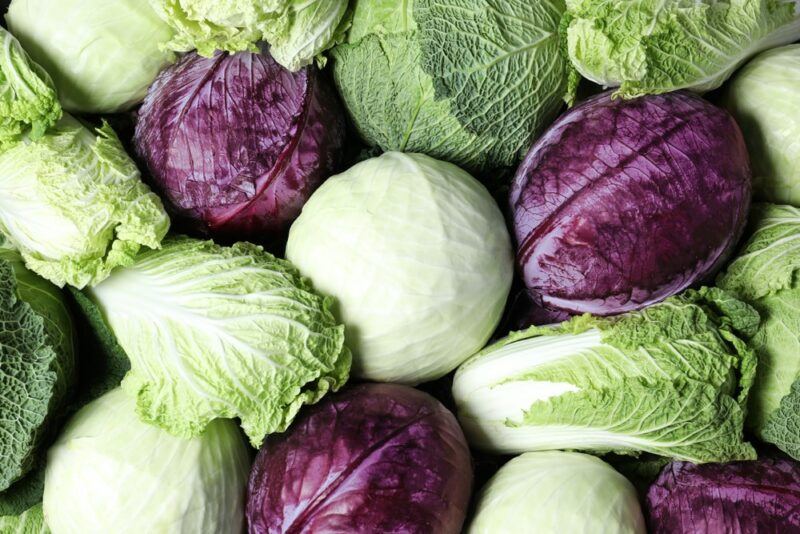
Can Give You Flatulence
You might have noticed that cabbage sometimes gives you gas, potentially leading to bloating or abdominal pain. This happens because of a sugar called raffinose, which our bodies can’t digest. The sulfur-containing compounds don’t help matters either.
While this side effect is frustrating, it isn’t harmful.
You can also reduce this effect by cooking the cabbage and rinsing it thoroughly. When you do so, many of the problematic compounds should rinse out, meaning less gas.
You can also try starting slowly with cabbage. Have small servings to begin with and give your body time to adjust to the compounds. You can then increase your intake slowly over time. You should get to the point where you can eat normal servings of cabbage without any problems at all.
Too Much Could Have Thyroid Effects
Like other cruciferous vegetables, cabbage contains goitrogens. These substances may offer health benefits, but they can also decrease the transport of iodine to your thyroid. This effect might contribute to thyroid issues.
There is even concern that high intakes of cruciferous vegetables might increase the risk of thyroid cancer.
For most people, getting enough iodine in your diet should be enough to reduce the risk of any thyroid problems. Anyone diagnosed with hypothyroidism, on the other hand, might need to limit their cabbage intake (or avoid cruciferous vegetables entirely). Still, plenty of studies have found that regularly eating cruciferous vegetables can improve health, so the benefits majorly outweigh the risks.
The Vitamin K Can Interfere With Blood Thinners
Cabbage contains a decent amount of vitamin K. While this vitamin is important for your health, it can also interact with blood thinning medications, making them less effective.
If you’re taking blood thinners, it’s best to keep your vitamin K levels roughly consistent. This way your medication can be adjusted to match your vitamin K intake.
Is Cabbage Low In FODMAPs?
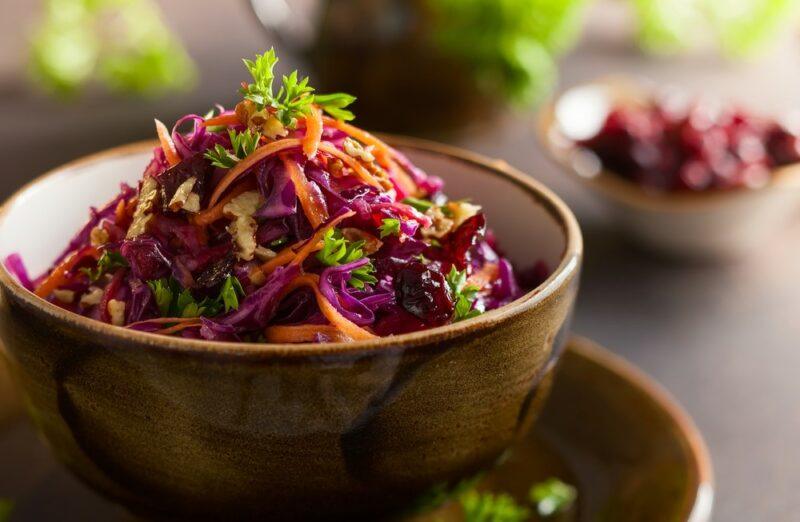
Cabbage often seems like it should be a high FODMAP food, especially as it can lead to gas. Despite this, testing shows that cabbage is low in FODMAPs (excepting savoy cabbage). As such, people following low FODMAP diets may be able to eat cabbage regularly.
We say may, however, as cabbage can still cause gas, which may be uncomfortable. If this is the case for you, try cooking cabbage with a few herbs, including coriander and dill seeds. The right combination of herbs may change the way your gut bacteria interacts with the cabbage and lead to less gas.
The Benefits Of Fermented Cabbage
You’ve heard about sauerkraut, right? This simple fermented dish is made using shredded cabbage, salt, and sometimes a few other ingredients (caraway seeds are a common addition).
There’s also kimchi, which is a Korean dish. It relies on cabbage and salt as well, but there can be plenty of other ingredients. Some versions even have unexpected additions, like Brussels sprouts. Not surprisingly, the flavor of kimchi can vary dramatically.
In both cases, you’re still getting nutrients from cabbage, along with healthy probiotics. These probiotics are basically microbes that can improve the balance of bacteria in your gut. They’re surprisingly powerful and could, in the right circumstances, improve your digestion, promote better mental health, and decrease your risk of disease.
Impressive, right?
If you’re buying kimchi or sauerkraut from the store, you’ll need to make sure that the product does still contain live probiotics. Some commercial versions are pasteurized to improve safety – an approach that kills the healthy microbes along with the unhealthy ones. The best products should be stored in the fridge and may have a label that states they contain live cultures.
You could make fermented cabbage yourself too. When doing so, please pay close attention to food safety every step of the way, as it’s too easy to contaminate your dish with harmful bacteria.
One more thing…
While dishes like kimchi and sauerkraut can be very good for you, they’re also packed with sodium. This is far from ideal and could be an issue if you’re following a low sodium diet.
If this is the case for you, it might be better to stick to unfermented cabbage and get your probiotics elsewhere. For example, kefir and kombucha are probiotic rich as well, but tend to be low in sodium.
Final Thoughts
Cabbage is somewhat controversial, due to how it makes you gassy and may cause thyroid problems. Despite this, cabbage provides many health benefits.
Plus, there have been many studies conducted on cabbage and cruciferous vegetables. It’s now very clear that such vegetables tend to make people healthier, rather than causing any serious issues.
Frequently Asked Questions
Is Cabbage Keto Friendly?
Cabbage is definitely keto friendly. More than that, it’s a popular keto alternative to high carb ingredients due to its versatility. You can even use it as an alternative to pasta or rice in some dishes.
Is Cabbage Good For Diabetics?
Cabbage has plenty of helpful features for diabetics, as it is a decent source of fiber and contains plenty of nutrients, while being low in both calories and carbs. As a result, cabbage is an excellent addition to diabetic friendly meals and something you can enjoy regularly.
Can You Eat Cabbage Raw?
Yes. Cabbage is completely safe when eaten raw (after all, it’s raw in some salads, including coleslaw). Just make sure to wash the cabbage leaves thoroughly, as any bacterial contamination on the cabbage could make you sick.
Is Cabbage Good For Weight Loss?
Low calorie and high nutrient foods like cabbage always help with weight loss. The fiber is relevant too, as this helps you to feel satisfied for longer.
Having plenty of foods like cabbage in your diet should help you keep your calorie intake manageable and promote weight loss.
Does Cabbage Cause Gas?
Like other cruciferous vegetables, cabbage contains a sugar called raffinose that can be fermented by bacteria in your gut – leading to excess gas. The high fiber content can also contribute to gas, especially if you’ve suddenly increased your fiber intake.
Cooked cabbage should give you fewer side effects than raw cabbage, as cooking decreases the number of gas-causing compounds. But, experiencing gas isn’t enough of a reason to avoid eating cabbage, as the vegetable is still incredibly good for you.




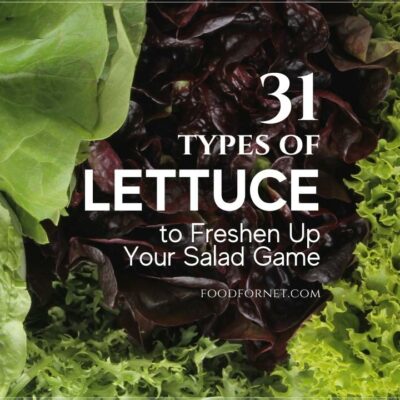
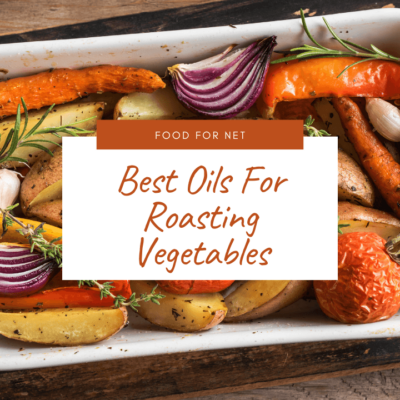







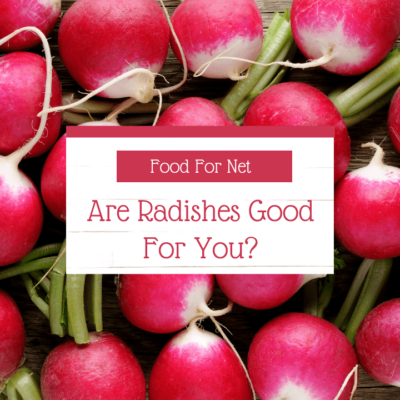



 5 Best Plant-Based Milk Brands
5 Best Plant-Based Milk Brands
Leave a Reply